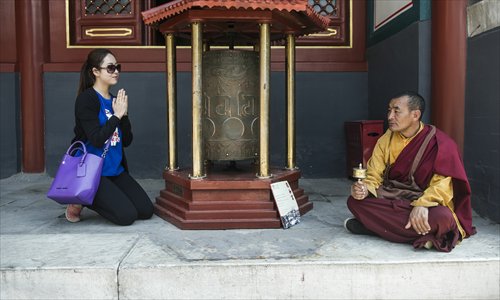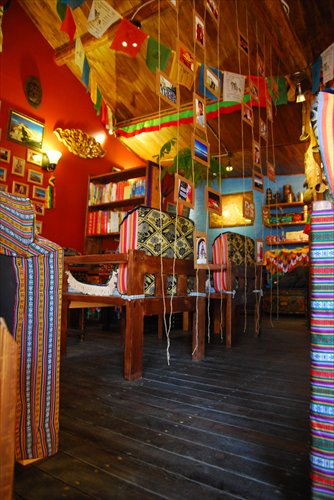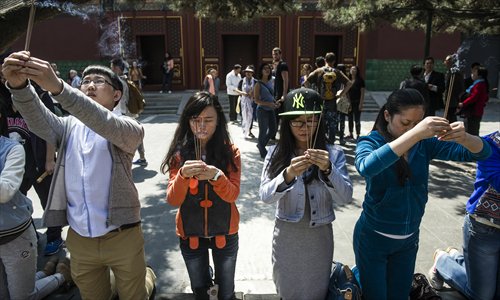HOME >> CHINA
Plateau Enlightenment
By Lin Meilian Source:Global Times Published: 2014-4-23 19:58:01

Young people praying at Yonghegong Lama Temple.

Tu Huan's Tibetan-style bar at Wudaoying Hutong.
The only thing more trendy than moving away from religion is moving towards it, said 29-year-old Liu Wen, a white-collar worker in Beijing who practices Tibetan Buddhism, a religious doctrine that has long been worshipped in China's Tibet Autonomous Region.
"Everyone is talking about Tibetan Buddhism now. Pop stars are talking about it, my friends are talking about it," Liu told the Global Times. "It is cool. It is even cooler to sing Tibetan prayers in Hip-hop!"
While more young people in the US are moving away from religion, in China, ostensibly a nation of atheists, many young adults like Liu say they feel a strong connection to Tibetan Buddhism.
To many people, Tibetan Buddhism and Han Chinese Buddhism are alike in many ways. Tibetan and Chinese Buddhism are two different practices that were formed on the same teachings. Chinese Buddhism has attracted many Chinese followers because it connects with Chinese culture and history. But Tibetan Buddhism offers the follower a wider range of practices and rituals that are believed to reach enlightenment faster.
The movement is flourishing and has become fashionable among young people in recent years. Many young non-Tibetan people wear Buddha prayer beads on their wrists as fashion accessories, but not necessarily as a mark of religious devotion.
"Many young people find Tibetan Buddhism more attractive than other religions because they think it is mysterious," Li Decheng, director of the Institute for Religious Studies under the China Tibetology Research Center, told the Global Times.
"It is also because it offers psychological comfort to these young people who find themselves lost amid China's rapid social and economic changes," Li continued.
Belief in Tibet
Located just west of the capital's Yonghegong Lama Temple is a Tibetan-style bar. Tibetan ornaments hang over windows and doors and photos of Tibet are hung on the walls painted with red and blue, making the 30-square-meter bar look more lively. Everything in the bar, from the tables to the benches, from the prayer flags to the Thangka paintings, has been brought from Tibet.
Every day after dawn, the bar is packed with young Chinese people, tourists and foreigners seem to erupt from the ground in groups of twos and threes.
One of the owners is 32-year-old Tu Huan from Chongqing, who practices Tibetan Buddhism. In 2010, the former IT worker quit his job, left everything behind and went to Tibet to "find himself."
"I was overwhelmed with my work, I wanted to slow down and think about what I really wanted in life," Tu told the Global Times.
In half a year, Tu exposed himself to the "mysterious" Tibetan culture and found himself touched by its environment and religion.
"I was stunned by those persistent prayers," he said. "It is hard for young people nowadays to be persistent at doing anything."
After mulling what he wanted in life, Tu came back to Beijing in 2010 and opened a Tibetan-style accessory shop with his friend. Three years later, they opened a bar next door, so people could discuss their beliefs.
Each year, millions of visitors travel to Tibet from elsewhere in China and abroad. Lots of young people like Huang and Tu travel to Tibet to find faith, or just to leave home for a break.
"Young people have traveled so often to Tibet that it is not cool anymore," Tu said. "It doesn't matter why you go to Tibet, it matters what you gain from Tibet."
Huang Yufan, 32, from Shenzhen, Guangdong Province said she felt a strong interest in Tibetan Buddhism after traveling to Tibet last year.
"I was always curious to see what religious people are like," Huang told the Global Times. "And I was touched to see how seriously they take it."
She remembers an occasion when she was drinking at a tea house in Lhasa, the capital of Tibet, and the waiter forgot to serve her tea. A Tibetan young man who was sitting next to her poured her tea from his own tea pot, and kept refilling it again and again. She offered to pay him, but he did not take the money.
"If I were elsewhere in China, I would be alert if a stranger did that for me because I would assume he was definitely after something, but in Tibet people do it for no reason," she said.
In a country where milk powder is tainted, dirty oil is recycled as cooking oil and even pollution spreads to vital rice crops, a lack of faith is responsible, at least according to Huang.
"With the lack of faith, people don't feel bad about doing bad things, and some would use violence to solve problems," Huang said.
"And if you don't have faith, you can't deal with so many of these negative things in your daily life," she continued.

Young people burn incense at the temple.
Faitheists arise
Even though China is officially atheist, freedom of religious belief is guaranteed by the Constitution. Buddhism has long been acknowledged as the major religious faith in China. Buddhism, Taoism, Catholicism, Protestantism and Islam are the five major religions.
It is officially estimated there are 100 million religious believers in China. However, occasionally Buddhist monks and nuns performing rites have been regarded as superstitious and local governments have wanted to downplay religious activities.
The country did not have survey on religious beliefs until 2007 when professors Tong Shijun and Liu Zhongyu of the Shanghai-based East China Normal University released their research results.
A poll of 4,500 Chinese aged above 16 found that 31.4 percent described themselves as religious, which suggests 300 million people nationwide could be religious, three times higher than the official figure.
The survey also found growing numbers of young people are developing an interest in religion. About two-thirds of those in the poll who considered themselves religious were aged between 16 and 39.
When it comes to the reasons, about 24 percent of the responses said religion "shows the true path of life." Another 20 percent said they find themselves at ease with religion.
"Many young people are very stressed and uptight in their daily lives, and they are more likely to turn to religion to find a balance," Li said.
Tashi Dondrup, a professor at Southwest University for Nationalities, said he has noticed more and more Han students wearing prayer beads in class.
"The younger generation is more open-minded towards religion, they seem curious about something that is different than their own culture," Dondrup told the Global Times.
Other reasons include disappointment in Han Chinese Buddhism.
"If I have to choose a religion, I would choose Tibetan Buddhism rather than others," 30-year-old Luo Hongbo from Hunan Province told the Global Times.
His first impression of Tibetan Buddhism came from poem picked by famous Chinese director Feng Xiaogang in his film If You Are the One 2 in 2010.
The poem, written by the Sixth Dalai Lama Tsangyang Gyatso, reads "Best not to meet you. Then I won't fall in love; Best not to know you. Then I won't miss you."
"I was surprised that a lama could have written such a beautiful poem," he said. "Since then I could not take my eyes off Tibetan Buddhism."
There is a Han Chinese Buddhist temple near his workplace. He said he never visits there and he is not going to.
"Even the current abbot of the Shaolin temple, Shi Yongxin, is a CEO now; I don't think he is too busy making money to care about life," Tu said.
Money worship is considered a new "religion" in China and many people have materialistic desires, Tu said.
"Many people make a lot of money and spend a lot of money, they don't feel happy and they don't know why," he said. "It is hard to find happiness without faith."
Tu said he does not make as much money as he used to, but he is a happier person now.
Fashion icon
Celebrity appeal is another attraction of Tibetan Buddhism. A number of celebrities, such as Faye Wong, a highly successful and influential Hong Kong singer, have expressed support for the religion. It was also reported that she became even more religious after she started having problems with her ex-husband.
On her 44th birthday, Wong posted a photo of her pilgrimage trip to Tibet on her Sina Weibo, which showed her red forehead from performing the kowtow ritual. When the couple divorced last year, there were even rumors she intended to become a nun.
Chen Kun, a top Chinese actor, published a book called Suddenly, I walk to Tibet in 2012, in which he described his amazing journey walking to Tibet to discover himself.
Spiritual books that help people to seek comfort have hit people's shelves. The new book Everything is the Best Arrangement written by Living Buddha Gyatso, in which he shares his understanding of happiness, sold 50,000 volumes in two weeks.
Even inspirational teachers such as Khenpo So Dargye, who has half a million followers on Weibo use social media, to give Buddhist advice.
But Tu said he thinks Tibetan Buddhism is more than just a fashion statement. "Fashion will fade one day, but the things that Tibetan Buddhism teach will spread."
Newspaper headline: Young Han Chinese turn to Tibetan Buddhism amid worldly frustrations
Posted in: In-Depth